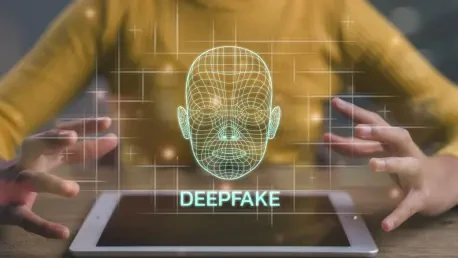In the digital age, where remote work becomes increasingly prevalent, companies are now facing a new kind of threat—deepfake technology infiltrating job interviews. This sophisticated method of deception has begun to take a prominent place in cybersecurity discussions, as it threatens not just identity theft but also organizational integrity. The potency of deepfakes lies in their ability to convincingly portray fake job candidates during video interviews, creating a complex challenge for hiring processes that have largely migrated online. As reported by cybersecurity experts, manipulating a video to create a fake job candidate can be accomplished in just over an hour by someone with no prior experience in image manipulation. This alarming ease of use has made organizations more vulnerable, particularly when considering that such actors may be motivated by state interests, like those from North Korea, to breach company networks and access sensitive data.
Understanding the Scope of Deepfake Concerns
Remote job interviews offer a convenient alternative to traditional in-person meetings, but they come with significant risks related to candidate authenticity. The urgent need to combat deepfake threats is driven by the extensive capabilities these digital forgeries possess. Deepfake technology uses artificial neural networks to produce realistic imitations of facial expressions and voices, casting doubt on the veracity of a candidate’s presence in interviews. With a growing reliance on remote hiring, companies have heightened their awareness of such possibilities, echoing concerns voiced by agencies like the FBI, which has highlighted the threat posed by remote-work fraud. Such fraudulent activities have already led to major repercussions, including serious financial consequences arising from the hiring of North Korean nationals purporting to be legitimate IT workers in the U.S. marketplace.
In anticipation of a significant rise in candidate fraud, experts project that by 2028, as many as 25% of job profiles could be counterfeit. The rise in deepfake incidents is compounded by the broader adoption of artificial intelligence in recruitment, presenting challenges that require innovative solutions. This calls for industries to adapt quickly, devising new ways to discern genuine candidates from fabricated ones. One proposed approach is to incorporate advanced verification processes, such as forensic document assessment and multifaceted ID checks. By maximizing these technological measures, employers can bolster defenses against increasingly intricate deceptions in digital interviews.
Innovating Detection and Prevention Practices
Given the intricate nature of deepfake technology, it is imperative for companies to refine their recruitment strategies to identify potential red flags during the hiring process. These include peculiar video behavior and inconsistencies in verbal synchronization that may suggest deepfake manipulations. Organizations are urged to focus on training HR teams to better recognize and report these discrepancies swiftly. Interviewers must maintain a heightened awareness during video assessments, questioning anomalies that could betray a candidate’s inauthenticity. Furthermore, advancements in digital technology can aid employers in compiling and analyzing interview recordings, which serve as a resource in evaluating questionable behaviors for signs of forgery.
Complementing technological approaches is the human-centered focus on education and vigilance. Employers are investing in comprehensive training sessions aimed at increasing awareness among hiring personnel, emphasizing how to pinpoint subtleties indicative of deepfake tampering. Recorded interviews not only enhance subsequent analysis but also act as a tool for developing AI models designed to detect irregular patterns. Such an integrated approach can fortify security measures, preventing infiltration by fraudulent applicants intent on exploiting sensitive business data through deceptive means.
Shaping Future Recruitment Protocols
The rising complexity associated with deepfake scams emphasizes the necessity for companies to reevaluate their recruitment protocols and adopt a more strategic outlook toward candidate verification. This evolving landscape has spurred discussions around the incorporation of AI-powered tools that rigorously screen candidates before any formal employment offer is extended. By adopting a multi-layered verification system, employers can secure an edge over deepfake schemes, effectively reducing the likelihood of deceptive applications slipping through the cracks.
Furthermore, the trend toward recording interviews allows companies to perform retrospective analyses, offering insights into the nuances of candidate behavior. Such practices not only mitigate risks but also elevate the overall rigor of recruitment procedures, marking a shift from a reactive to a proactive stance against fraudulent job applicants. To stay ahead in an increasingly AI-integrated employment landscape, companies are also exploring collaborations with cybersecurity firms for solutions tailored to detecting and addressing deepfake threats, ultimately paving the way for more secure and reliable hiring processes.
Strategic Adaptation to Safeguard Talent Acquisition
Remote job interviews have become a popular alternative to traditional face-to-face meetings due to their convenience. However, these virtual interactions come with significant risks, particularly regarding candidate authenticity. The emergence of deepfake technology, which employs artificial neural networks to create lifelike imitations of facial expressions and voices, intensifies these concerns. As reliance on remote hiring grows, companies are increasingly aware of this threat, echoing warnings from organizations like the FBI about fraud in remote work scenarios. Such fraudulent activities have already led to severe consequences, like financial losses from hiring North Korean nationals posing as legitimate IT workers in the U.S.
Experts warn that by 2028, up to 25% of job profiles could be fake due to the rise of deepfakes and broader AI adoption in recruitment. This escalating issue calls for innovative solutions, compelling industries to quickly adapt. Implementing sophisticated verification processes, such as forensic document analysis and comprehensive ID checks, can help differentiate genuine candidates from imposters and protect against digital interview deceptions.









